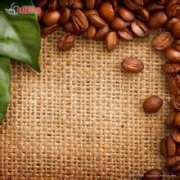A brief introduction to the grinding degree and roasting degree of Panama Jensen Estate coffee beans

Esmeralda Specialty, an emerald estate in Panama, is a rare bidding bean for an award-winning estate, setting a new record three times in online auctions. June 2004, 21 dollars a pound, May 2006, 50.25 dollars a pound, May 2007, 130 dollars a pound, and in May 2010, 170 dollars a pound, with an aura of invincibility and invincibility. The geisha of the Jade Manor has become a fantasy product of the coffee industry. "its flower scent is like fireworks, blooming in the mouth in the process of drinking, with juice like lemon, citrus and strawberry, making it look like juice rather than coffee." Geisha coffee fan Jeff said, "what kind of coffee can be as invincible as a geisha?" Drinking geisha coffee from the Jade Manor of Panama every year, like a birthday feast, has become an indispensable ceremony for him every year.
Lion grows in the Panamanian plateau at an altitude of 1700 meters above sea level. The harvest is from January to March every year, and it usually takes about August to reach the hands of domestic buyers. Using the method of washing, it has very strong aromas of jasmine and apricot, sweet fruit and warm fruit. After sipping, it has very obvious aromas of sweet peach, red berry, passion fruit and rose apple sugar. It's like a memory that I can't forget for a long time.
Every time Cat Ye writes these bean reviews, he always comes with the same cup of coffee, but this cup of rosy summer is really a cup of beans that people can't bear to drink too quickly, because every time I drink it, I always wonder if I won't be able to drink this kind of coffee one day, and how to go on with my life.
With so many beans recommended, this bean is the least in stock but the most worthwhile for Maoye to write a special article for her to share with everyone. Again, why is Rosa so expensive? just buy it and have a drink. Good coffee is not allowed to be missed, just like a good girl can't let go easily.
Feicui Manor is famous for its Geisha variety. Rose summer seeds were discovered in the rose summer forests of Ethiopia in 1931 and sent to the Coffee Institute in Kenya, and then introduced to Uganda, Tanzania and Costa Rica, all mediocre. It was not until it was transplanted to Panama in the 1960s that it became a blockbuster after nearly half a century. Beat Bourbon, Kaddura, Kaduai and Tibica on BOP (Best of Panama) in 2005, 2006 and 2007, and won the championship for three years in a row. In 2007, the International famous Bean Cup Test sponsored by the American Fine Coffee Association (SCAA) won the championship again, and the bidding price was sold at US $130 per pound, setting a record for the highest price in the history of competition beans. Rosa, a member of the Tibika family, grew into the king of coffee in the land of Panama after leaving Ethiopia. It successfully conquered the taste buds with rich floral and fruity aromas and bright acidity.
Taste rosy summer, after the entrance of the beautiful sweet, accompanied by a slight floral fragrance, comfortable and balanced taste, long-lasting rhyme. The unique fruity aromas of litchi, lemon and citrus are amazing enough. Carefully capture the aroma of peach and apricot, the overall feeling is cool and transparent. Every time
In addition, the Alida Manor to be introduced is also another heavyweight star manor in the Bokui specialty area. The area where it is located is about 1670-1725 meters above sea level, and the main varieties of coffee grown in the farm are the improved kaduai, as well as a small number of bourbon and Tibica.
Although the Rosa Variety was planted a few years ago, Kaduai was used in all the batches of the BOP competition and achieved good results, closely following the Emerald Manor in the number of winners. Thus it can be seen that Panama produces high-quality coffee, which is closely related to its unique geographical advantages. At the same time, the fine operation of the manor harvest and processing link also plays a vital role in determining the quality of raw beans.
In addition to creating good coffee cultivation conditions, the Lamastus family, which runs the Elida estate, has also planted many different native tree species on the estate, not only to shade the coffee trees, but also to provide a friendly habitat for birds. In terms of fertilization, the Lamastus family uses artificial fertilization and a small amount of chemical fertilizers, but never uses pesticides and herbicides that are harmful to the environment.
At present, in addition to Catuai, Typica and Bourbon, the Lamastus family also began to plant Geisha varieties a few years ago. In spite of this, Elida Manor used Catuai in all the batches of Best of Panama competition, but achieved good results again and again, which shows the excellent quality and special flavor of coffee brought by its geographical environment and excellent postharvest treatment technology.
In 1931 Rose Summer left the mountain village with all her childhood memories with her sister and was resold to various coffee merchants. After a wandering life in Kenya, Tanzania, Costa Rica and other countries, Rose Summer came to Panama in the 1960s and settled on a hillside of Volcan Baru volcano.
In November 1964, Peterson, a banker, bought Esmeralda Farm. He took a fancy to Rosa's unique citrus temperament and decided to turn it into a legend. Therefore, the Peterson family used scientific and experimental methods to carefully analyze the microclimate and treatment details in the manor, continuously improve the treatment model after the experiment, and persistently record and analyze the flavor performance of different planting areas one by one. In 2004, she won the first place in BOP (Best of Panama), which opened the prelude to Rose Xia becoming a world-class coffee star.
Important Notice :
前街咖啡 FrontStreet Coffee has moved to new addredd:
FrontStreet Coffee Address: 315,Donghua East Road,GuangZhou
Tel:020 38364473
- Prev

Balanced sweetness of Brazilian Queen's Manor Yellow bourbon Fine Coffee beans Grinding degree treatment method
Facts have proved that Brazil also has the ability to produce gourmet coffee and small batches of coffee. The local boutique coffee can not only be provided by small-scale coffee farmers. The main coffee producing areas in Brazil are Sulde Minas South Minas, Matas de Minas Minas Southeast Mountain Forest, Cerrado Hirado, Chapadas de Minas Minas Central and Northern Mausoleum, Mogiana Mojiana.
- Next

Tropical fruit-scented boutique coffee beans at kotowa Manor in Panama. Geographical location and climate.
The freshness of beans feels on the fast side, and the astringency at the end of the bean does not disappear with a small Fuji mill or changing filter paper. The fault tolerance rate is not particularly high in rose summer (the water temperature above 95 degrees will exceed 2min20s), but the flavor level is very open, and the complexity of flower and fruit aroma is more complex than that of jade rose summer, which tends to the unrestrained flavor of tropical fruits (sun-dried beans).
Related
- Does Rose Summer choose Blue, Green or Red? Detailed explanation of Rose Summer Coffee plots and Classification in Panamanian Jade Manor
- What is the difference between the origin, producing area, processing plant, cooperative and manor of coffee beans?
- How fine does the espresso powder fit? how to grind the espresso?
- Sca coffee roasting degree color card coffee roasting degree 8 roasting color values what do you mean?
- The practice of lattes: how to make lattes at home
- Introduction to Indonesian Fine Coffee beans-- Java Coffee producing area of Indonesian Arabica Coffee
- How much will the flavor of light and medium roasted rose summer be expressed? What baking level is rose summer suitable for?
- Introduction to the characteristics of washing, sun-drying or wet-planing coffee commonly used in Mantenin, Indonesia
- Price characteristics of Arabica Coffee Bean Starbucks introduction to Manning Coffee Bean Taste producing area Variety Manor
- What is the authentic Yega flavor? What are the flavor characteristics of the really excellent Yejasuffi coffee beans?

